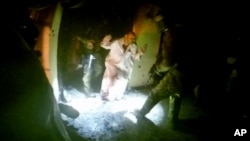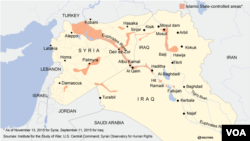Fear of Islamic State terror attacks on American and European soil has pushed the U.S., Britain and Germany to expand and intensify their military actions and airstrikes against the extremists.
But more bombs, while important, are not going to be enough to defeat Islamic State, said Barry Pavel, Director of the Brent Scowcroft Center on International Security.
“Hitting more targets, that’s a good thing,” Pavel acknowledged. “And the only way to do that is to increase the tempo of military operations. Every little bit helps.”
The pace of the anti-Islamic State fight is still too incremental, he told VOA. “Instead of taking baby steps, we are taking 10 baby steps. We should be assuming that an attack has already occurred in the U.S., and what we would do after that attack – we should do that now.”
Myriad airstrikes
Since August 2014, the United States has conducted more than 8,000 airstrikes against Islamic State in Iraq and Syria, but the group still enjoys a flourishing oil and antiquities trade. And it continues to control major tracts of land as well as cities in both countries.
Increased airstrikes “are not going to be a tipping point” in the war, agreed Jonathan Wood, Associate Director of global risk analysis for Control Risks.
With the U.S. allies sharing the same information, intelligence and surveillance, Wood did not expect to see any dramatic shift in the type of targeting carried out. And he said it was unlikely that France and the U.K. would be able to significantly increase the bombing tempo.
“There are just not going to be enough airstrikes to make a dramatic difference,” Wood told VOA.
Washington and its allies have long acknowledged the fight against Islamic State could not be won through an air campaign alone.
United front
U.S. Secretary of State John Kerry this week talked of the need for an international agreement on a political transition in Syria that would “empower every nation and every entity to come together – the Syrian army together with the opposition, together with all the surrounding countries, together with Russia, the United States and others – to go and fight Daesh.”
Islamic State is sometimes known as Daesh.
“Just imagine how quickly this scourge could be eliminated – in a matter of literally months – if we were able to secure that kind of political resolution,” said Kerry.
U.N. Secretary General Ban Ki-moon also has urged the world to unite. The U.N. is working on launching an initiative in January that would involve both intra-Syrian political talks and a nationwide cease-fire.
Analysts agree a political solution was needed, but feel the rallying calls are optimistic.
“One of the key reasons as to why the incipient peace initiatives are not likely to result in any major change in the facts on the ground is because the stakeholders have such disparate objectives in terms of what the end game looks like,” Wood said.
The U.S. and its allies are calling for Syrian President Bashar al-Assad to step down, and are backing anti-Assad rebels on the ground including the Syrian Kurdish Peshmerga.
Competing interests
Washington’s ally, Turkey, is equally determined to undermine the Kurds in order to prevent them from gaining a political-military foothold on their Turkish-Syrian border.
Syrian Kurdish forces are unlikely to let go of any land gains.
Russia and Iran, which are both present in Syria, are supporting Assad, with Moscow bombing U.S.-supported rebels, as well as civilians.
The Gulf states, which initially had worked with Washington, appear to have slipped out of the Syria fight and have turned their focus to battle Iran indirectly in Yemen.
In the midst of this chaos, the al-Qaida branch Jabhat al-Nusra and Islamic State are brutally battling for supremacy and appear to be taking their fight global.
It will be up to Washington to pull all those disparate players together to defeat the extremists, said Pavel, Director of the Scowcroft Center.
“They haven’t sensed the United States taking an all-in approach to this, so they have decided to hew to their own narrow agendas,” said Pavel.
The November 13 attacks in Paris that left 130 dead was a wake-up call.
“The United States has figured out how to lead diverse actors in the past, and it is time to do that again,” Pavel said.








